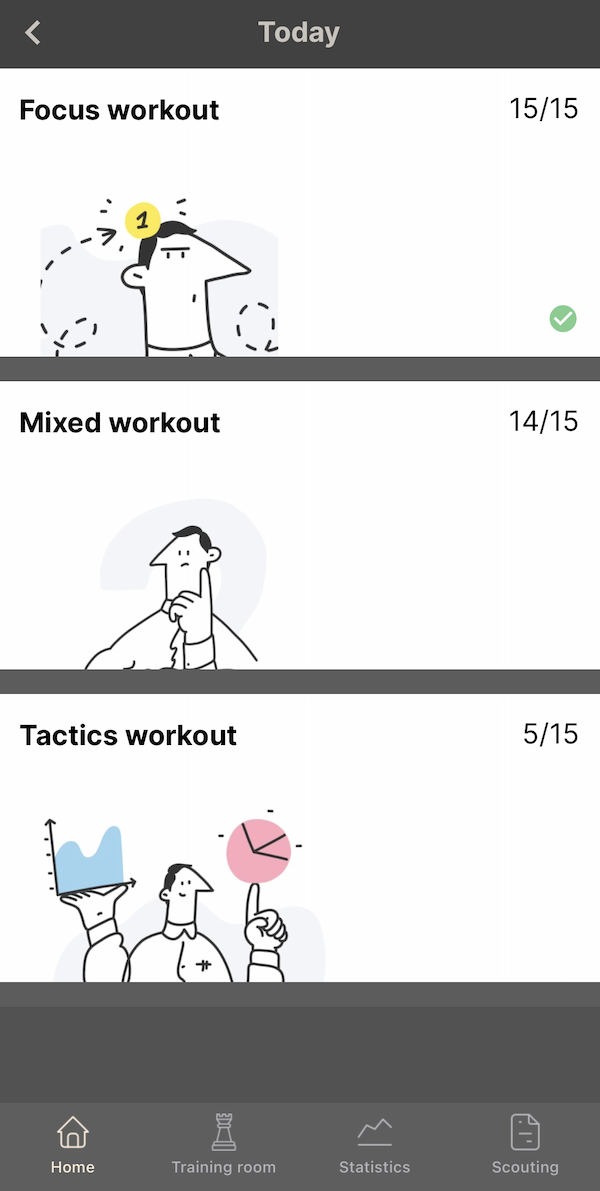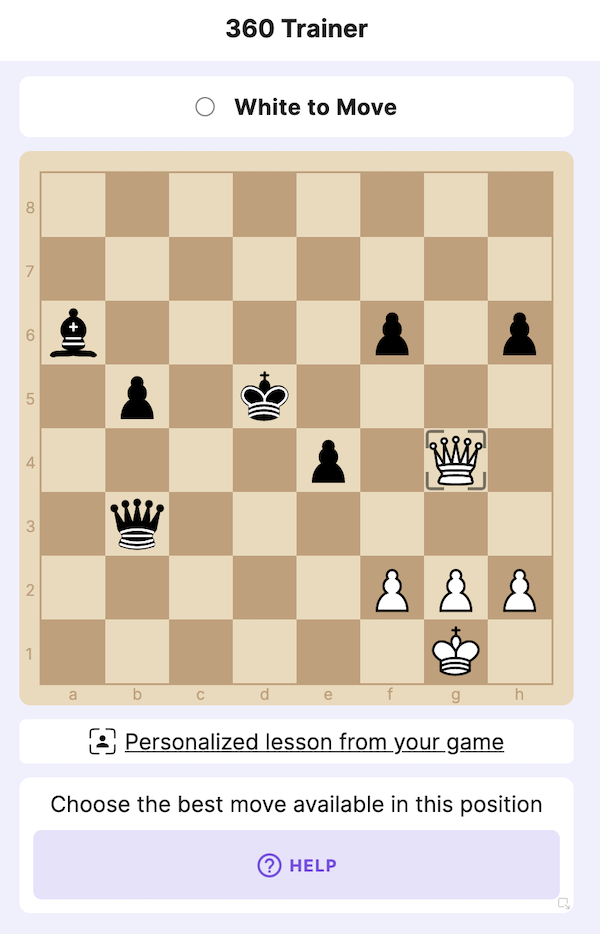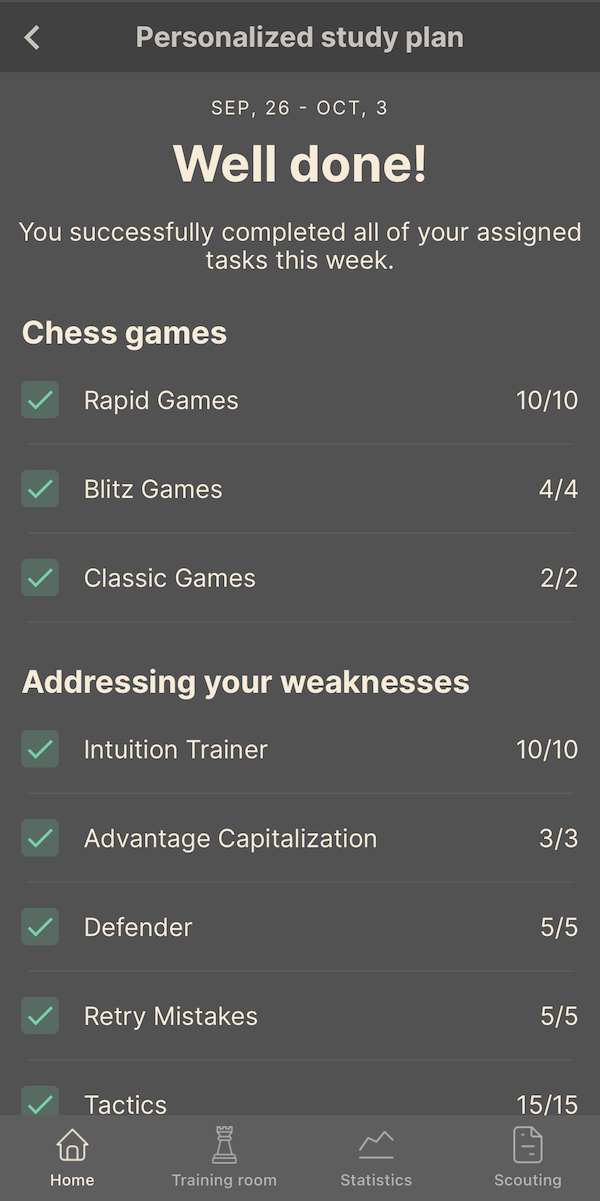I have been using Aimchess daily for a little over a month now. I wanted to share how it works in case other people are interested in trying it out.
There is a web-based version and mobile apps. I mostly use the iOS app since it seems easier to do the daily lessons on there. However, some things, like the reports, are easier to review on the web or a tablet.
This is not a sponsored review, I have just seen a number of people asking about Aimchess lately.
Setup and Subscription
As you are setting up your account, you get to link to a chess.com, Lichess, and Chess24 account. You get one of each, and you can’t change these. Well, technically you can if you changed your username or started a new account, but it isn’t something you can do all the time. These linked accounts will be used to fetch your games and do analysis.
Aimchess is subscription based, and I have the yearly subscription. If you get the monthly subscription, there are codes you can find to get 30% off (hint: Aimchess sponsors a few podcasts, so you can find codes there). The yearly subscription is 40% less than the normal monthly subscription. Without a subscription there is a limit to what you can do each day.
If you are going to subscribe, feel free to use my Aimchess referral code. With that I think I get free reports, but I have not tested that out.
Daily Activities
This is where I spend most of my time:

Every day there is a new set of lessons for you. In the next section I’ll talk about all the different types of lessons. These are typically puzzles you solve that are broken down into 3 categories: Focus, Mixed, and Tactics. Each one has 15 lessons, though there is some overlap so each day usually has about 40 new lessons. If I do all the lessons, it is something like 200-300 puzzles/studies per week. It usually takes me 15-20 minutes per day.
This has become the main way I do tactics now, since that is always included in the daily session. Many of the lessons could be considered tactics, but I’m doing 15-20 per day (100+ per week) that are geared towards me.
The great thing about Aimchess is that it pulls some examples directly from your games. If you made a mistake in a game, you will often get the chance to try to find the best move in a daily lesson.
Lesson Formats

Here are the current types of lessons you can do during your daily session. You can also practice any of these more whenever you want in the “Training Room.” This is the current list, but I feel like Aimchess keeps adding new ones.
- Advantage Capitalization: Takes your games where you had an advantage but lost the game and let’s you play through against Stockfish to try to win. Typically starts somewhere in the middlegame.
- Tactics: No surprises here. Just tactics puzzles
- Opening Improver: I actually haven’t done any of these, but it is meant to help you review your openings and looks for common mistakes.
- Practice Visualization: Shows you a position and you try to remember it. It will ask things like where were the pieces, how many checks do you have, or capture a specific piece - all blindfold.
- Blunder Preventer: This gives you a two moves and you have to make the best one. The one that is not a blunder
- 360 Trainer: This is like solving tactics puzzles, but there isn’t necessarily a tactic. It is more just finding the best move in a variety of positions. Some will be taken from your own games.
- Intuition Trainer: This has you step through a series of moves, and you have to find the one that was a mistake.
- Retry Mistakes: These come from your games and you have to try to make the correct move, not the mistake you made during the game.
- Endgame: Figure out the sequence of moves in an endgame position
- Defender: Defend against checks, captures, or threats in a variety of positions
- Time Trainer: Another one I have not done yet, but I am not playing much blitz which is where I think it would come in handy.
- Blindfold Tactics: This has a board with what look like checkers with the initial positions listed below. You have to find the best move
- Checkmate Patterns: Timed flashcards to drill checkmate patterns.
Reports
![Aimchess Re[prt]](/img/aimchess/aimchess-report.png)
This is one of my favorite things to review. Using your recent games, Aimchess will generate a report that shows your strengths and weaknesses. It compares you against players in a similar rating range as you. Obviously I would not be anywhere close to a GM, but for other players my level it interesting to see where I line up.
For each one of these categories there is much more details. For example, you can see in the chart above that I struggle with “Resourcefulness”, which is coming from behind in games. The report has detailed statistics and then links to lessons to help me work on this. There are also links to my games where I struggled that I can review.
Personalized Study Plan

Each week there is a new study plan generated. It is a combination of games and lessons. For me this week it recommends I play 10 rapid games, 2 classical games, and 4 blitz games. The lessons are a certain number of specific lessons that map to your weakest areas. I do the daily routine every day, which incorporates the recommended lessons.
Other Stuff
- Yearly Recap: I think this is available for everyone, but it shows a report of all the games your played. It has how long you’ve played, win percentages, favorite openings, and more. You can check it out at aimchess.com/recap
- Warmup: There is a “warmup” feature that is a timed series of puzzles. I’ve tried it before a game and I am not sure if it helped or not. It certainly did not hurt to do a few extra puzzles before a game.
- Scouting: You can generate a “scouting report” for any user on the three main sites that looks at their last 40 games. Seems like it would be helpful before a tournament if you knew who you were playing.
- Studies: This seems like a fairly new area in Aimchess. There are a few drills on Checkmate patterns (king and some other piece vs king and a different piece) drills which are good. There also recently added some Advantage Capitalization drills in here.
Results
I can’t say if this is helping my rating. However, I really like having a consistent set of puzzles/lessons that I can do each day. Especially since at least some of the puzzles are taken directly from my own games so I can learn from my mistakes. I feel like doing a little bit each day is helping me build up my skills and Aimchess takes care of one aspect of my chess study.
Any questions? Ask me on twitter!